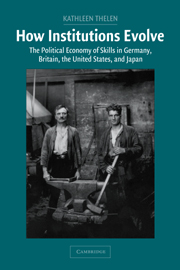 How Institutions Evolve
How Institutions Evolve Book contents
- Frontmatter
- Contents
- Preface
- 1 THE POLITICAL ECONOMY OF SKILLS IN COMPARATIVE-HISTORICAL PERSPECTIVE
- 2 THE EVOLUTION OF SKILL FORMATION IN GERMANY
- 3 THE EVOLUTION OF SKILL FORMATION IN BRITAIN
- 4 THE EVOLUTION OF SKILL FORMATION IN JAPAN AND THE UNITED STATES
- 5 EVOLUTION AND CHANGE IN THE GERMAN SYSTEM OF VOCATIONAL TRAINING
- 6 CONCLUSIONS, EMPIRICAL AND THEORETICAL
- Bibliography
- Index
- Cambridge Studies in Comparative Politics
5 - EVOLUTION AND CHANGE IN THE GERMAN SYSTEM OF VOCATIONAL TRAINING
Published online by Cambridge University Press: 05 September 2012
- Frontmatter
- Contents
- Preface
- 1 THE POLITICAL ECONOMY OF SKILLS IN COMPARATIVE-HISTORICAL PERSPECTIVE
- 2 THE EVOLUTION OF SKILL FORMATION IN GERMANY
- 3 THE EVOLUTION OF SKILL FORMATION IN BRITAIN
- 4 THE EVOLUTION OF SKILL FORMATION IN JAPAN AND THE UNITED STATES
- 5 EVOLUTION AND CHANGE IN THE GERMAN SYSTEM OF VOCATIONAL TRAINING
- 6 CONCLUSIONS, EMPIRICAL AND THEORETICAL
- Bibliography
- Index
- Cambridge Studies in Comparative Politics
Summary
Previous chapters have focused primarily on explaining variations across the four countries that are the subject of this study, and have traced the roots of important differences in vocational training institutions back to the political dynamics and coalitions that were forged around the turn of the century and into the 1920s. This chapter takes up the German case again and tracks its further development through National Socialism and into the post-World War II period. This involves a shift in focus, away from the origins of cross-national differences to variations over time within a single country. This shift allows us to address a related but distinct set of questions and theoretical issues concerning institutional stability and change.
As discussed in Chapter 1, the most commonly invoked metaphor for institutional change is the punctuated equilibrium model as it was adapted from the work of evolutionary biologists and interpreted for politics by Krasner in 1988 (Krasner 1988). This model emphasizes long stretches of institutional “stasis” periodically punctuated by episodes of relatively rapid innovation. In most treatments, innovation occurs as a result of some kind of exogenous shock that disrupts the stable reproduction of institutions and provides an opening for substantial institutional reconfiguration. This view of political and institutional change is pervasive, finding expression in a good deal of the literature on “critical junctures” as well as some treatments of path dependence. This kind of model captures one important mode of change in political life.
- Type
- Chapter
- Information
- How Institutions EvolveThe Political Economy of Skills in Germany, Britain, the United States, and Japan, pp. 215 - 277Publisher: Cambridge University PressPrint publication year: 2004


